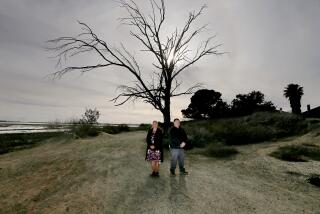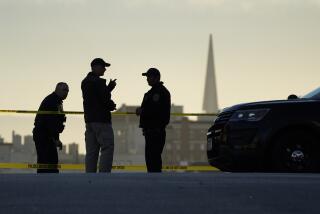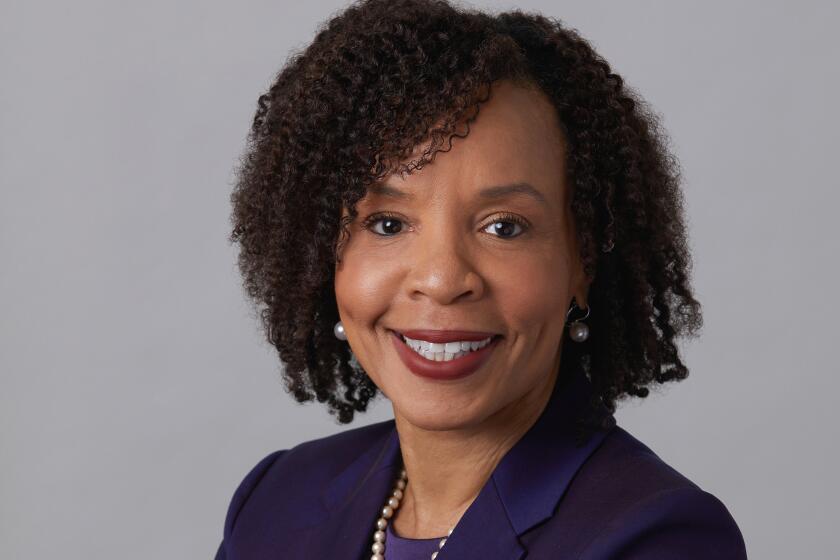Donovan Quits Post; Charges Upheld in Court
Labor Secretary Raymond J. Donovan, on leave of absence since he was indicted in October, resigned Friday after a New York judge refused to dismiss fraud and larceny charges.
President Reagan accepted the resignation “with deep regret” and said Donovan was “entitled to the benefit of a presumption of innocence.”
There was no immediate official word on his successor. But an Administration source said speculation centered on former Rep. John Erlenborn, an Illinois Republican; Kay McMurray, director of the Federal Mediation and Conciliation Service; James Miller, head of the Federal Trade Commission; and Edward J. Rollins, White House political director.
Since Donovan’s indictment, the Labor Department has been run by Undersecretary Ford B. Ford.
Met With Reagan
Donovan met with the President in the Oval Office and discussed his decision to leave, said White House spokesman Larry Speakes, after a New York state judge rejected the secretary’s bid to have the charges dismissed on grounds the prosecution was biased.
In a written statement later, Reagan said: “Ray Donovan has not been convicted of anything; and no less than any other American, he is entitled to the benefit of a presumption of innocence. While I agree with Ray that his need to devote himself fully to his defense now precludes his continuing in office, he leaves the Cabinet with my friendship and heartfelt gratitude for all of his efforts on behalf of this Administration.”
Donovan said in a statement issued by the Labor Department that he did not want his personal problems “to distract the President or the country from the Administration’s mission of securing America’s pre-eminent position in the world.”
Donovan, the first sitting Cabinet member ever to be indicted, still protested that he was innocent and vowed to fight to prove it.
On Oct. 1, Donovan was named in a 137-count indictment issued by a grand jury in New York City charging him with larceny and fraud.
‘No Justification’
“The evidence in this case, if proved and believed, demonstrates a carefully contrived scheme to steal property,” said New York state Supreme Court Justice John P. Collins, in refusing the secretary’s request to dismiss the charges. “There is no justification warranting this court to dismiss the indictment in the interests of justice.”
AFL-CIO President Lane Kirkland, who had been feuding with Donovan ever since he was appointed, called on Reagan to name a secretary “who will vigorously pursue the statutory obligations of the Department of Labor.”
The labor federation has complained that under Donovan, the department relaxed its enforcement of regulations to make workplaces safer, while at the same time stepping up its policing of union activities.
Presser Sends Best Wishes
But Donovan had always enjoyed a close relationship with the Teamsters union, and its president, Jackie Presser, said after the secretary resigned: “In this unfortunate situation, all I want to do is send my prayers and best wishes to Raymond Donovan and to his family.”
Donovan, in a statement issued by his lawyers in Washington, said: “I have not violated any law, and I am confident that a jury will find me not guilty after hearing all the evidence.”
Donovan has denied any knowledge of a subcontract that is at the heart of the charges against him. The subcontract was entered into while Donovan was executive vice president of the Schiavone Construction Co.
The indictment accused Donovan and nine other defendants of using a phony equipment lease arrangement to circumvent rules requiring contractors receiving federal funds to give some of their work to minority-owned firms. Prosecutors say the scheme defrauded New York City’s Transit Authority of $7.4 million.
In urging Collins to dismiss the indictment, defense lawyers accused prosecutors of misleading the grand jury with incomplete or tainted evidence.
Bronx Prosecutor Comments
But Bronx District Attorney Mario Merola said in a telephone interview after reports surfaced of Donovan’s resignation: “This office didn’t bring him down. His conduct brought him down.”
The indictment, which includes one count of second-degree larceny and 136 counts of producing and filing false documents, was the latest in a series of legal battles that have dogged Donovan since before he joined the Cabinet.
At his Senate confirmation hearing, Donovan was questioned intensively about allegations that Schiavone paid persons for no-show jobs. He was the last of Reagan’s choices to be confirmed, winning approval on an 80-17 vote.
A month later, in February 1981, five Democratic senators asked for a new probe of his activities, saying they had found two serious inaccuracies in an FBI investigation. Later that year, Donovan asked that a special prosecutor be named.
The following June, that special prosecutor, Leon A. Silverman, said there was “insufficient credible evidence” for any charges. Reagan declared: “The case is closed.”
Election Charge Dropped
Donovan was also accused of violating provisions of election laws when he was a fund raiser for Reagan in the 1980 campaign but the Federal Election Commission decided in June, 1983, not to investigate.
Donovan was subpoenaed and forced to testify in November, 1983, at the trial of two former union leaders charged with lying to a grand jury. At that time he testified he knew nothing of ghost-employee jobs at Schiavone. The indictment stemmed from that case.
Donovan claimed an aura of “McCarthyism” was behind the charges.
The judge has yet to rule on a separate defense motion asking him to dismiss the case because electronic surveillance evidence shown to the grand jury was gathered illegally by the FBI. He set a hearing on that motion for Tuesday.
More to Read
Get the L.A. Times Politics newsletter
Deeply reported insights into legislation, politics and policy from Sacramento, Washington and beyond. In your inbox three times per week.
You may occasionally receive promotional content from the Los Angeles Times.






